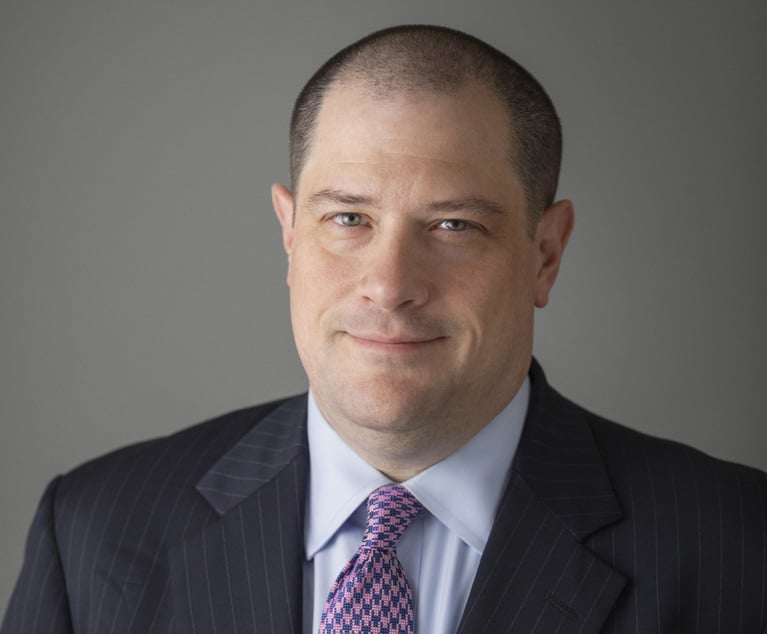 U.S. Supreme Court building. Photo by Diego M. Radzinschi.
U.S. Supreme Court building. Photo by Diego M. Radzinschi.9 Justices Shouldn't Abide by 9 Sets of Rules
Part of the job of a justice is deciding tough cases, and some polarization can be justified. Yet a closer examination of the court reveals the confounding fact that it's not just the issues of the day on which the justices lack agreement. It's also how they comport themselves as purportedly unprejudiced public officials, a place where consensus should rule the day.
May 16, 2019 at 12:51 PM
5 minute read
This week, the U.S. Supreme Court issued an opinion that the more cynical among us—or, frankly, the more realistic—have come to expect: a 5-4 breakdown that overturned 40 years of precedent. Slim margins are also anticipated for closely watched cases, likely decided next month, on whether the Department of Commerce may add a citizenship question to next year's census and whether partisan gerrymanders in Maryland and North Carolina are constitutional.
Members of the high court are fond of saying that about half their opinions are unanimous, with another 20%-30% nearly so. Yet it's the 5-4 decisions—on issues such as health care, immigration and same-sex marriage in years past, and likely on the census and gerrymandering later this spring—that are most remembered and, often, most consequential.
Part of the job of a justice is deciding tough cases, and some polarization can be justified. Yet a closer examination of the court reveals the confounding fact that it's not just the issues of the day on which the justices lack agreement. It's also how they comport themselves as purportedly unprejudiced public officials, a place where consensus should rule the day.
For example, it's against the law for a federal judge or justice to hear a case in which he or she has a financial stake in a litigant, and that's why, we presume, most of the members of the judiciary avoid owning individual stocks. But on the high court, for reasons that defy logic, Chief Justice John Roberts Jr., Justice Stephen Breyer and Justice Samuel Alito hold shares in such companies as Time Warner, Johnson & Johnson and United Technologies, each of which appears before the court annually, often both as litigants and as the authors of influential “friend of the court” briefs.
That means a third of the bench is proactively exposing itself to potential conflicts or required disqualifications. This colors which cases are heard and how the public views the institution.
We know about the justices' financial holdings since, by law, they must be listed on their annual financial disclosure reports, due each year on May 15. And therein lies another difference: eight of the nine (all but Breyer) list no outside help in filling out their reports. Breyer uses an accounting firm, but no issue for him: judiciary rules allow a reimbursement up to $1,370 for professional assistance. How nice.
On those disclosures—2017's are the most recently available—seven of the nine (all but Breyer and Justice Sonia Sotomayor) indicate that they teach to earn additional income. That's permitted, capped at about $28,000 per annum. But several justices teach at law schools whose faculties often comment on and litigate cases before the court. Yet these plush adjunct positions persist.
Five of the nine (all but Roberts, Justice Clarence Thomas, Justice Neil Gorsuch and Justice Brett Kavanaugh) in 2017 reported at least half a dozen subsidized trips—from Hawaii to The Hague, Montreal to Mexico City—for which their food, airfare and lodging was reimbursed, often by a dogmatic bar association or law school.
And six of the nine (all but Roberts, Breyer and Justice Elena Kagan) have in the last two years been a featured speaker at a liberal or a conservative legal society event, each populated with Supreme Court advocates and funders of influential “friend of the court” briefs. What's worse, there was no crossover—e.g., no Democratic-appointed justice appeared at a major conservative event, or vice versa.
At the very least, six of the nine have managed to hold their tongues publicly the last few years regarding the president's recurring third-branch critiques, as the justices are admonished not to discuss politics publicly. Three have not fared as well. Roberts directly responded to a Trump missive calling a California jurist “an Obama judge” based his asylum ruling by telling the Associated Press, “We do not have Obama judges or Trump judges, Bush judges or Clinton judges.” Justice Ruth Bader Ginsburg called Trump “a faker,” adding, “He really has an ego.” And Gorsuch said Trump's attacks on federal judges were “disheartening” and “demoralizing.”
With apologies to Roberts, we expect the justices nowadays to mirror the polarization of our political branches, and that the court does comprise Obama judges and Trump judges, Bush judges and Clinton judges.
It's problematic, though, from a moral leadership perspective, that they're also stock-owning judges and faculty judges, partisan-event judges or junket judges.
Sure, there won't be any more David Souters: none of today's justices is a candidate to consistently switch sides of the partisan divide. But what the nine can and should do is come together and switch their deficient views on how an ethical, life-tenured federal official ought to act.
Gabe Roth is executive director of Fix the Court, a national nonpartisan organization that advocates for a more open and accountable federal judiciary.
This content has been archived. It is available through our partners, LexisNexis® and Bloomberg Law.
To view this content, please continue to their sites.
Not a Lexis Subscriber?
Subscribe Now
Not a Bloomberg Law Subscriber?
Subscribe Now
NOT FOR REPRINT
© 2024 ALM Global, LLC, All Rights Reserved. Request academic re-use from www.copyright.com. All other uses, submit a request to [email protected]. For more information visit Asset & Logo Licensing.
You Might Like
View All
Protecting Attorney-Client Privilege in the Modern Age of Communications
6 minute read

Lingering Questions at Supreme Court About Climate Change Litigation Need Resolution
6 minute read
Trending Stories
Who Got The Work
Michael G. Bongiorno, Andrew Scott Dulberg and Elizabeth E. Driscoll from Wilmer Cutler Pickering Hale and Dorr have stepped in to represent Symbotic Inc., an A.I.-enabled technology platform that focuses on increasing supply chain efficiency, and other defendants in a pending shareholder derivative lawsuit. The case, filed Oct. 2 in Massachusetts District Court by the Brown Law Firm on behalf of Stephen Austen, accuses certain officers and directors of misleading investors in regard to Symbotic's potential for margin growth by failing to disclose that the company was not equipped to timely deploy its systems or manage expenses through project delays. The case, assigned to U.S. District Judge Nathaniel M. Gorton, is 1:24-cv-12522, Austen v. Cohen et al.
Who Got The Work
Edmund Polubinski and Marie Killmond of Davis Polk & Wardwell have entered appearances for data platform software development company MongoDB and other defendants in a pending shareholder derivative lawsuit. The action, filed Oct. 7 in New York Southern District Court by the Brown Law Firm, accuses the company's directors and/or officers of falsely expressing confidence in the company’s restructuring of its sales incentive plan and downplaying the severity of decreases in its upfront commitments. The case is 1:24-cv-07594, Roy v. Ittycheria et al.
Who Got The Work
Amy O. Bruchs and Kurt F. Ellison of Michael Best & Friedrich have entered appearances for Epic Systems Corp. in a pending employment discrimination lawsuit. The suit was filed Sept. 7 in Wisconsin Western District Court by Levine Eisberner LLC and Siri & Glimstad on behalf of a project manager who claims that he was wrongfully terminated after applying for a religious exemption to the defendant's COVID-19 vaccine mandate. The case, assigned to U.S. Magistrate Judge Anita Marie Boor, is 3:24-cv-00630, Secker, Nathan v. Epic Systems Corporation.
Who Got The Work
David X. Sullivan, Thomas J. Finn and Gregory A. Hall from McCarter & English have entered appearances for Sunrun Installation Services in a pending civil rights lawsuit. The complaint was filed Sept. 4 in Connecticut District Court by attorney Robert M. Berke on behalf of former employee George Edward Steins, who was arrested and charged with employing an unregistered home improvement salesperson. The complaint alleges that had Sunrun informed the Connecticut Department of Consumer Protection that the plaintiff's employment had ended in 2017 and that he no longer held Sunrun's home improvement contractor license, he would not have been hit with charges, which were dismissed in May 2024. The case, assigned to U.S. District Judge Jeffrey A. Meyer, is 3:24-cv-01423, Steins v. Sunrun, Inc. et al.
Who Got The Work
Greenberg Traurig shareholder Joshua L. Raskin has entered an appearance for boohoo.com UK Ltd. in a pending patent infringement lawsuit. The suit, filed Sept. 3 in Texas Eastern District Court by Rozier Hardt McDonough on behalf of Alto Dynamics, asserts five patents related to an online shopping platform. The case, assigned to U.S. District Judge Rodney Gilstrap, is 2:24-cv-00719, Alto Dynamics, LLC v. boohoo.com UK Limited.
Featured Firms
Law Offices of Gary Martin Hays & Associates, P.C.
(470) 294-1674
Law Offices of Mark E. Salomone
(857) 444-6468
Smith & Hassler
(713) 739-1250








